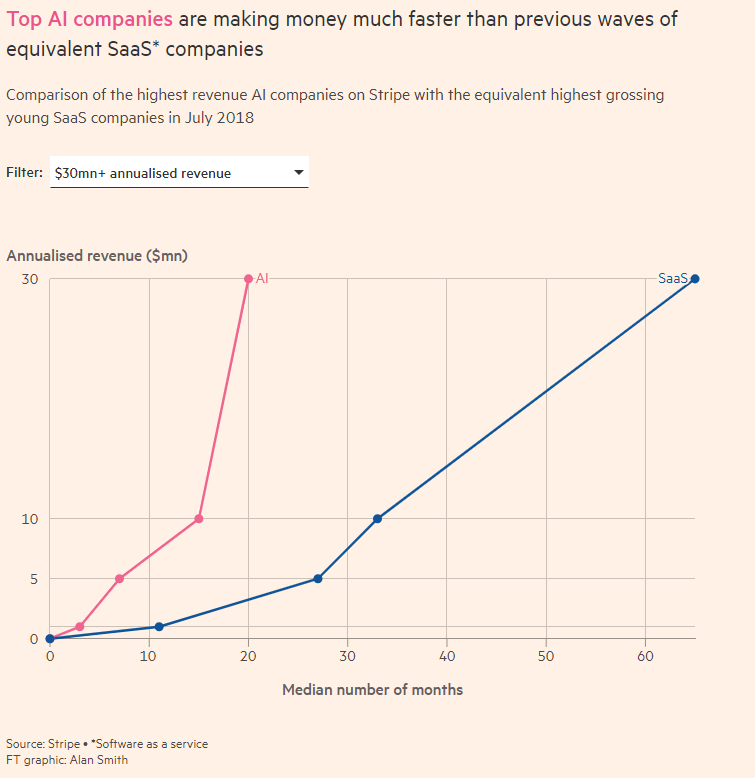
OpenAI’s New Developments and the Ultimate Life Hack
Plus: How one writer uses AI to maximize meaning
October 6, 2024
Hello, and happy Sunday! Q4 started off with a flurry of activity and anticipation—Dan Shipper flew from Paris to San Francisco to report from OpenAI’s second-annual DevDay, while Evan Armstrong stands at the precipice of fatherhood. Read on for more details and our take on the latest tech news.—Kate Lee
Was this newsletter forwarded to you? Sign up to get it in your inbox.
Knowledge base
"Everything OpenAI Launched at DevDay" by Dan Shipper/Chain of Thought: OpenAI hosted a DevDay with two big accomplishments. First, the company invited Dan (a wise choice), and then it released some cool products that allow founders to easily integrate voice modes into their own products. They open up some intriguing possibilities for apps that are suddenly now possible. Read this to see what new startups could be built.
“OpenAI's Canvas: The AI-Powered Word Processor You Didn't Know You Needed" by Dan Shipper and Evan Armstrong/Chain of Thought: If you take a smallish amount of LSD, squint, and turn your head 42 degrees to the right, you can see how OpenAI’s newest product lays the groundwork for a computing revolution. It’s a little bit like if an LLM and a word processor got frisky. More than that, it's OpenAI's shot at becoming the operating system for the AI age. Read this if you want to see what the future of work might look like.
"A Day at the Center of the AI Boom" by Dan Shipper/Chain of Thought: Dan takes us on a whirlwind tour of San Francisco during a hackathon last year, capturing the city's unique blend of innovation, contradiction, and relentless optimism. This essay paints a vivid picture of a place living in the future, from naked encounters in saunas to AI discussions over sushi. Read this if you want to experience the fever dream of tech's capital without leaving your chair.
"You're Probably Using AI Wrong" by Rhea Purohit/Learning Curve: Forget efficiency—it's time to use AI for meaning. Rhea Purohit struggled to integrate AI into her writing until she realized she was asking the wrong questions. Instead of outsourcing her work, she now uses AI to enhance the parts of her process she loves. Read this for a fresh perspective on AI and practical steps to identify what brings you meaning in your work and life. Bonus: Learn how to have a meaningful conversation with an AI about your own workflow.
"Dad Mode" by Evan Armstrong/Napkin Math: Want to level up your life faster than any self-help book could dream of? Have a kid. Evan's impending fatherhood kicked him into "dad mode," transforming his approach to career, health, and relationships. Read this for a look at how the prospect of a tiny human can be the ultimate motivator for personal growth.
Time is your most valuable asset. At Silicon Valley's relentless pace, staying ahead demands smarter learning.
Shortform delivers the most in-depth summaries of the world’s top nonfiction books, including Cal Newport’s Deep Work. Our guides offer detailed insights, practical strategies, and exercises, so you can turn knowledge into action right away.
Get smarter, faster, and gain a competitive edge. Start your free trial today and get 20% off your subscription.
Fine tuning
The end of the open web. Google has quietly killed the internet by integrating ad results into AI search summaries: The company will scrape content from publishers, republish it using LLMs, and take all the profit. I weep for the internet of yesteryear—it didn’t have to be like this, and we can do nothing to stop it.
Your face isn’t safe. Two Harvard students used publicly available tools (with a little custom code) to jerry-rig a pair of Meta’s glasses to recognize strangers and pull their names, phone numbers, places of employment etc. To see if it was real, I rebuilt the tech myself sans Meta glasses, and it worked. Freaky! Once again, there’s nothing you can do to stop it. One of the under-discussed capabilities of LLMs is how easy they make it to scrape the web and pull personal data. Be careful if strangers who seem to know things about you approach you in public.
$10.6 billion in capital for OpenAI. The largest venture capital round of all time has been anointed onto OpenAI. The company raised $6.6 billion in equity with an additional $4 billion or so in a revolving credit line. The plan is basically to use this money to scale to GPT5, and if the scaling law holds, probably raise money again. Credit to them for not thinking small! One note of clarification: I’ve seen many comments about how investors are “expecting a 10x return” on this deal, so OpenAI has to be a trillion-dollar company. That is incorrect. Growth-stage investors like those who participated in this deal would typically be looking for a 3-5x return. A $500-ish billion outcome, but not as large as people are expecting. What is unusual is how much scientific risk investors are willing to underwrite while still deploying this amount of capital.—Evan Armstrong
Data mining
Speed to revenue: According to data from Stripe, the largest AI companies are growing revenue much more quickly than their SaaS counterparts:
Source: Stripe via the Financial Times.The median speed to $30 million in annual recurring revenue for the largest AI companies is 20 months, while it took the 100 largest SaaS companies more than three times as long to achieve the same amount. One could argue that the comparison isn’t entirely fair because the top AI companies have built-in distribution advantages given their relationships with some of the biggest companies in the world (such as OpenAI and Microsoft, and Anthropic and Amazon, but even so, that revenue growth is a thing to behold. It took this cohort 15 months to reach $10 million in annual recurring revenue, and just give more months to triple that. Top SaaS companies took more than three years to make the same leap. Will that growth rate hold? Who knows. But given how AI is lowering the barriers to entry for software development, there’s reason to think that tech companies will be able to find product-market fit (and scale) much more quickly than before.—Moses Sternstein
Keyword extraction
Rhea Purohit, who wrote about using AI for meaning rather than efficiency, shared one good read:
🖇 11 Explorations Into Life on Earth by Helen Scales: “In a world where technology is advancing at breakneck speed, this book—a collection of lectures about the evolution of the natural world—is a healthy dose of perspective. It’s a grounding reminder that every complex system we recognize has developed through slow, intricate processes over millennia.”
Alignment
AI eats SEO. Tension ran high at this year’s BrightonSEO conference in the UK. The SEO pros in attendance—who've built careers on Google's algorithms—worried about their jobs and feared the industry might change beyond recognition. Google's search dominance is waning: Search volume is down, users are adding "Reddit" to queries for authentic answers, and competitors like Perplexity and TikTok are stealing market share with AI and visual search, respectively. In SEO, AI is the bulldozer of this creative destruction, or when new technologies replace old systems while driving progress. Instead of ignoring the situation, I saw many forward-thinking professionals who know that change is inevitable and are preparing by tinkering with AI rather than fearing it. It's easy to feel pessimistic, but the message at the conference was clear: Don't dodge the bulldozer. Learn to drive it.—Ashwin Sharma
Sentiment analysis
"I never had kids but found 'dad' mode early in life due to chronic illness and an expectation I might have to retire early. I reached the place where I had 'enough'—and also made a turn around healthwise a few years ago. Dad mode was flipped off in more ways than one. Would slightly caution against wholly subsuming yourself into providing for the little one. They will do just fine with warmth, love, food and water—especially in the early years. Much of the rest is just a kind of consumerism, and marketers and their enablers (other parents, wider society, etc.) are really good at guilting parents into thinking what they are doing is not enough. You will, however, do just fine.”—An NGO innovation manager in response to Evan’s piece about “dad mode”
“This is exactly how I’ve been using AI to be more ‘efficient’ in my writing. AI does the drudgery when a wall has been hit, and then I’m free to wordsmith, embellish, and edit to my liking. The time I’ve saved on hemming and hawing is astounding…You can’t expect (nor should you want) to have AI spit out your words for you. But if you prompt it nicely, it can prompt you back nicely, and then you’re on your way to a collaborative creation between you and your tireless AI writing buddy.”—A retail entrepreneur in response to Rhea’s piece about how she uses AI in her writing process
Want to chat? DM Dan or Evan on X.
Hallucination
What if smartphones could deploy airbags when dropped?
Source: X/Lucas Crespo.That’s all for this week! Be sure to follow Every on X at @every and on LinkedIn.
Find Out What
Comes Next in Tech.
Start your free trial.
New ideas to help you build the future—in your inbox, every day. Trusted by over 75,000 readers.
SubscribeAlready have an account? Sign in
What's included?
-
Unlimited access to our daily essays by Dan Shipper, Evan Armstrong, and a roster of the best tech writers on the internet
-
Full access to an archive of hundreds of in-depth articles
-
-
Priority access and subscriber-only discounts to courses, events, and more
-
Ad-free experience
-
Access to our Discord community





Comments
Don't have an account? Sign up!